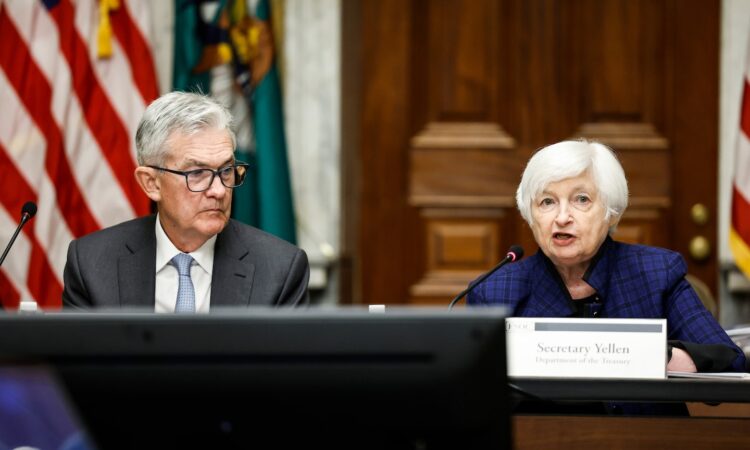
Officials at the Treasury Department, Federal Reserve, and Federal Deposit Insurance Corporation discussed the idea this weekend, the people said, with only hours to go before financial markets opened in Asia. White House officials have also studied the idea, per two separate people familiar with those discussions
The plan would be among the potential policy responses if the government is unable to find a buyer for the failed bank. The FDIC began an auction process for SVB on Saturday and hoped to identify a winning bidder Sunday afternoon, with final bids expected by 2 p.m. Eastern time, according to two people familiar with the matter.
Selling SVB to a healthy institution remains the preferred solution, officials have told members of Congress. Most bank failures are resolved that way and enable depositors to avoid losing any money.
In calls with federal banking regulators late Saturday and Sunday, Democrats said they were “praying for a buyer,” said Rep. Brad Sherman (D-Calif.), a member of the House Financial Services Committee. “Big buyer, small buyer, fat buyer, skinny buyer — we need a buyer,” he said. “If they have a bunch of buyers, I would argue you take the best offer,” he said, noting then they can “quibble about which offer to take.”
Although the FDIC insures bank deposits up to $250,000, a provision in federal banking law may give them the authority to protect the uninsured deposits as well if they conclude that failing to do so would pose a systemic risk to the broader financial system, the people said. In that event, uninsured deposits could be backstopped by an insurance fund, paid into regularly by U.S. banks.
Before that happens, the systemic risk verdict must be endorsed by a two-thirds vote of the Fed’s Board of Governors and the FDIC board along with Treasury Secretary Janet Yellen. No final decision has been made, but the deliberations reflect concern over the collateral damage from SVB’s collapse and authorities’ struggle to respond amid limits on their powers implemented following the 2008 financial bailouts.
“We’ve been hearing from those depositors and other concerned people this weekend. So let me say that I’ve been working all weekend with our banking regulators to design appropriate policies to address this situation,” Yellen said on the CBS’s “Face the Nation.”
Officials have grown increasingly alarmed by the prospect that SVB’s collapse could lead depositors to move their money out of similarly situated banks and into the safer Wall Street firms.
“They’re trying to work out legal and politically justifiable way to protect all uninsured deposits,” said one person familiar with the discussions.
Spokespeople for the White House, Treasury, Federal Reserve, and FDIC all declined to comment.
Any decision to provide unusual assistance to SVB’s depositors would likely draw opposition. As discussions continued Sunday, some experts said that problems at the bank — and others like it — did not pose a threat to the U.S. financial system.
“I think it’s going to be hard to say that this is systemic in any way,” Sheila Bair, former head of the FDIC, said on NBC’s “Meet the Press.”
The bank’s collapse would cost its shareholders and could trigger economic problems for companies that kept large uninsured sums on deposit, said Anil Kashyap, a professor at the University of Chicago’s Booth School of Business. But that did not mean the broader financial system would be imperiled as it was during the 2008 crisis.
“This isn’t a systemic event. This is a midsize bank that was badly managed,” he said “It may be a little messy. But that’s different than if you have somebody at the core of the financial system stop making payments to somebody else at the core of the system and then the core implodes.”
The U.S. banking system is highly concentrated, with the top five institutions holding almost $13 trillion in assets. Even if other banks that are comparable in size to SVB suffered depositor runs, the overall financial system would continue to function, he said.
Bob Hockett, a Cornell University professor who worked at the central bank, said the FDIC has the legal means under the “systemic risk exception” of the Federal Deposit Insurance Corporation Improvement Act to intervene.
“That option is still available. If there looks like there could be a bank run on all the non-Jamie Dimon banks, they can, in a pinch, insure previously uninsured deposits for the full amounts,” Hockett said. “They can do this for over $250,000 per deposit.”
Top federal regulators briefed key lawmakers about the bank’s collapse and the government’s response late Saturday, with plans to convene again later Sunday afternoon, according to two sources familiar with the matter, who spoke on the condition of anonymity to describe the sensitive discussions.
On the late Saturday call, lawmakers sounded an urgent note about the need to find a buyer for SVB, and some raised fresh concerns that there could be financial contagion, especially if the U.S. cannot resolve the bank’s payouts to depositors swiftly, one of the people said.
With fears growing that there could be a run on other small or regional banks, some members of Congress also sought to reassure their constituents that their cash is safe. On Sunday, Sen. Joe Manchin III (D-W.Va.) stressed in a statement that the banking system is “stronger and sounder now than any time” since the financial crisis.
“I urge the American people to allow the protections already in place to insure individual deposits and the well-being of local and regional banks, particularly in rural communities like we have in West Virginia, to be fully realized before reacting out of fear and amplifying the problem,” he said.
Leigh Ann Caldwell contributed reporting.





